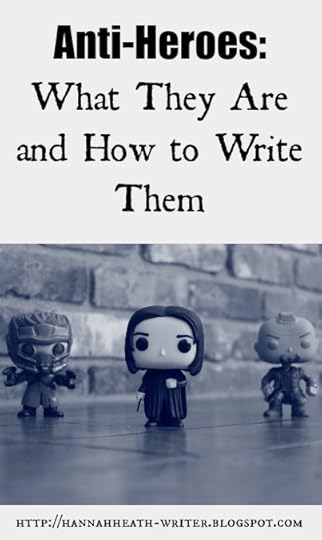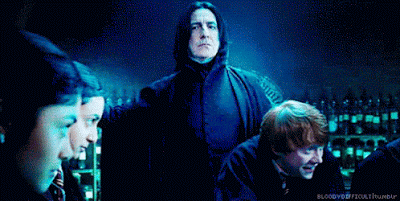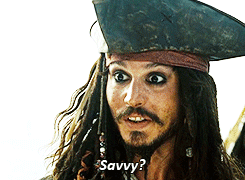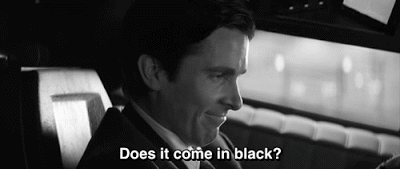Anti-Heroes: What They Are and How to Write Them
Writers like to use colors. We like to describe sunsets, mention what particular shade a character's eyes are, and use blue as a way to convey sadness. Oranges, purples, reds, yellows. We use them all to give depth to our stories.
But what about the color grey? That's one that writers either adore or shy away from. Personally, I like grey. Grey stories, dark heroes, antagonists with moral compasses. Grey always seems to lend a depth to stories, probably because it is more reflective of our world and the people who live in it.
My favorite color of grey is Anti-hero. This is a type of character that seems to confuse a lot of people, which makes sense because the very nature of an anti-hero isn't one that makes a lot of sense. Their personalities are conflicted and contradictory and almost defy categorization.
 But, because writers are so fond of naming things and putting them neatly into little boxes, they've been given the name "Anti-hero." Which works as far as the naming goes. But putting them neatly into little boxes? Yeah. Not so much.
But, because writers are so fond of naming things and putting them neatly into little boxes, they've been given the name "Anti-hero." Which works as far as the naming goes. But putting them neatly into little boxes? Yeah. Not so much.
However, for the sake of creating good characters, I'm going to go ahead and try and explain these characters. It's not going to be neat and there will be no little boxes, but at least there will be some organized chaos.
An anti-hero, put simply, is a hero that does not possess all of the usual heroic qualities. For example:
Heroes try to save the galaxy because they are courageous and care about the wellbeing of others. Anti-heroes try to save the galaxy because they're one of the idiots who lives in it.
[image error] Heroes stand up to evil, noseless wizards because it's the right thing to do. Anti-heroes stand up to evil, noseless wizards because they made a promise to try to protect a loved one and her son. Of course they never promised to be nice while doing it.
 Heroes rescue kidnapped people because kidnapping is wrong (and maybe because they're in love with the kidnapped person...but that's secondary. Hopefully). Anti-heroes rescue kidnapped people because it means they might get their ship back...along with some rum.
Heroes rescue kidnapped people because kidnapping is wrong (and maybe because they're in love with the kidnapped person...but that's secondary. Hopefully). Anti-heroes rescue kidnapped people because it means they might get their ship back...along with some rum.
 Generally anti-heroes do the (somewhat) right thing, but for the (somewhat) wrong reasons. They usually have major flaws (selfishness, violence, cowardice, etc.) that are not very hero-like. They are aware of their unheroic-ness but, frankly my dear, they don't give a damn. They aren't in the hero business for purely altruistic reasons and they often clash with the "good guys" as well as the antagonists. They often believe that the ends justify the means, which means that they're fine with getting their hands dirty to finish a mission. Sometimes they end up turning hero by the end of the series, though this isn't always true or necessary.
Generally anti-heroes do the (somewhat) right thing, but for the (somewhat) wrong reasons. They usually have major flaws (selfishness, violence, cowardice, etc.) that are not very hero-like. They are aware of their unheroic-ness but, frankly my dear, they don't give a damn. They aren't in the hero business for purely altruistic reasons and they often clash with the "good guys" as well as the antagonists. They often believe that the ends justify the means, which means that they're fine with getting their hands dirty to finish a mission. Sometimes they end up turning hero by the end of the series, though this isn't always true or necessary.
Other examples of varying levels of anti-heroes are: Sherlock (from the Sherlock TV series), Wolverine, Johanna Mason, Han Solo, Rooster Cogburn, Asajj Ventress (in her later years), Cassian Andor, The Punisher, and Iron Man (in his early years).
Now, on to how to write a good one:
1. They need rules. All anti-heroes have lines they aren't willing to cross. They all have things that they consider wrong, but those things are generally few and far between. While they may be fine with killing, they don't slaughter innocents. Perhaps stealing is generally fine, but never take lollipops from children. Be as irreverent as you like, but always be respectfully of the old lady living across the street.
2. Give them complex motives. Anti-heroes aren't the type to be guilted into a job. They like to leave the saving the world business to Superman and the like. If they're going to take action, they need a reason that goes beyond, "Because it's what a good human would do" or even "It's what a normal human would do." They do things to get even, to gain money, to keep tabs on someone, to atone for past sins, or because it just looks like a lot of fun. They don't need to care about a cause to fight for it, they just need to care about what the cause can do for them. Anti-heroes can have noble intentions, they just may not know how to handle them (or even be aware that they're there).
3. They don't have to be your main character. A lot of people have the idea that the story need to be told from the anti-hero's point of view. It doesn't. Anti-heroes can work as a great foil to your main hero, so don't feel the need to show the entire story from your anti-hero's view point. You can, but you don't have to.
4. The story shouldn't suggest that their negative behavior is correct. I know a lot of writers who are willing to fight me on this, but I'm going to stand by this. Anti-heroes will have negative traits. That's okay. Real-life people have tons of negative traits. However, these traits should not be glorified or made to look "cool." They are destructive and, ultimately, harmful to the character's soul. Don't pretend otherwise.
5. Don't forget to give them good qualities. Seriously. There's no need to look at your grey character and ask:
 Don't go overboard. Anti-heroes are not misunderstood villains. Remember that there's still a hero in there somewhere. Give him/her admirable qualities. A classic quality of an anti-hero is that they have plunged themselves into filth in order to keep a friend or loved one clean. Perhaps they are incredibly courageous, care deeply about those around them, or work to inspire others to keep fighting.
Don't go overboard. Anti-heroes are not misunderstood villains. Remember that there's still a hero in there somewhere. Give him/her admirable qualities. A classic quality of an anti-hero is that they have plunged themselves into filth in order to keep a friend or loved one clean. Perhaps they are incredibly courageous, care deeply about those around them, or work to inspire others to keep fighting.
6. Keep them walking the line. What line, you ask? The line between hero and non-hero. They should constantly be on the edge, forced to decide what it is they are going to do: The right thing? The easy thing? They should make surprising choices. There will be times when they will let people down (including themselves). But there will also be moments where they turn around and do something incredibly...heroic.
7. They don't have to be extremely attractive. Seriously. Anti-heroes do not need to be suave, black-haired, stormy-eyed, and gorgeous. Get creative, people.
8. Give them an arc. Your anti-hero needs to have some kind of shift. They don't need to swing all the way over into knight-in-shining-armor zone, but they should at least come out of the book with a new outlook or positive trait or good deed under their belt. It's called a character arc. Everyone needs one. Don't be mean and leave your anti-hero arc-less.
My current WIP has an anti-hero, so these are all tips I've found helpful with my own writing. Do you have any tips of your own to share? I'd love to hear them! And don't forget to tell me about your favorite anti-heroes! Mine is Snape. Always.
Related Articles:
Darkness in Fiction: 7 Tips for Writing Dark Stories
6 Tips for Writing an Imposing and Complex Villain
Enjoy this post? Take a look around. If you like what you see, don't forget to subscribe by email for a new post every Friday!

But what about the color grey? That's one that writers either adore or shy away from. Personally, I like grey. Grey stories, dark heroes, antagonists with moral compasses. Grey always seems to lend a depth to stories, probably because it is more reflective of our world and the people who live in it.
My favorite color of grey is Anti-hero. This is a type of character that seems to confuse a lot of people, which makes sense because the very nature of an anti-hero isn't one that makes a lot of sense. Their personalities are conflicted and contradictory and almost defy categorization.
 But, because writers are so fond of naming things and putting them neatly into little boxes, they've been given the name "Anti-hero." Which works as far as the naming goes. But putting them neatly into little boxes? Yeah. Not so much.
But, because writers are so fond of naming things and putting them neatly into little boxes, they've been given the name "Anti-hero." Which works as far as the naming goes. But putting them neatly into little boxes? Yeah. Not so much.However, for the sake of creating good characters, I'm going to go ahead and try and explain these characters. It's not going to be neat and there will be no little boxes, but at least there will be some organized chaos.
An anti-hero, put simply, is a hero that does not possess all of the usual heroic qualities. For example:
Heroes try to save the galaxy because they are courageous and care about the wellbeing of others. Anti-heroes try to save the galaxy because they're one of the idiots who lives in it.
[image error] Heroes stand up to evil, noseless wizards because it's the right thing to do. Anti-heroes stand up to evil, noseless wizards because they made a promise to try to protect a loved one and her son. Of course they never promised to be nice while doing it.
 Heroes rescue kidnapped people because kidnapping is wrong (and maybe because they're in love with the kidnapped person...but that's secondary. Hopefully). Anti-heroes rescue kidnapped people because it means they might get their ship back...along with some rum.
Heroes rescue kidnapped people because kidnapping is wrong (and maybe because they're in love with the kidnapped person...but that's secondary. Hopefully). Anti-heroes rescue kidnapped people because it means they might get their ship back...along with some rum. Generally anti-heroes do the (somewhat) right thing, but for the (somewhat) wrong reasons. They usually have major flaws (selfishness, violence, cowardice, etc.) that are not very hero-like. They are aware of their unheroic-ness but, frankly my dear, they don't give a damn. They aren't in the hero business for purely altruistic reasons and they often clash with the "good guys" as well as the antagonists. They often believe that the ends justify the means, which means that they're fine with getting their hands dirty to finish a mission. Sometimes they end up turning hero by the end of the series, though this isn't always true or necessary.
Generally anti-heroes do the (somewhat) right thing, but for the (somewhat) wrong reasons. They usually have major flaws (selfishness, violence, cowardice, etc.) that are not very hero-like. They are aware of their unheroic-ness but, frankly my dear, they don't give a damn. They aren't in the hero business for purely altruistic reasons and they often clash with the "good guys" as well as the antagonists. They often believe that the ends justify the means, which means that they're fine with getting their hands dirty to finish a mission. Sometimes they end up turning hero by the end of the series, though this isn't always true or necessary.Other examples of varying levels of anti-heroes are: Sherlock (from the Sherlock TV series), Wolverine, Johanna Mason, Han Solo, Rooster Cogburn, Asajj Ventress (in her later years), Cassian Andor, The Punisher, and Iron Man (in his early years).
Now, on to how to write a good one:
1. They need rules. All anti-heroes have lines they aren't willing to cross. They all have things that they consider wrong, but those things are generally few and far between. While they may be fine with killing, they don't slaughter innocents. Perhaps stealing is generally fine, but never take lollipops from children. Be as irreverent as you like, but always be respectfully of the old lady living across the street.
2. Give them complex motives. Anti-heroes aren't the type to be guilted into a job. They like to leave the saving the world business to Superman and the like. If they're going to take action, they need a reason that goes beyond, "Because it's what a good human would do" or even "It's what a normal human would do." They do things to get even, to gain money, to keep tabs on someone, to atone for past sins, or because it just looks like a lot of fun. They don't need to care about a cause to fight for it, they just need to care about what the cause can do for them. Anti-heroes can have noble intentions, they just may not know how to handle them (or even be aware that they're there).
3. They don't have to be your main character. A lot of people have the idea that the story need to be told from the anti-hero's point of view. It doesn't. Anti-heroes can work as a great foil to your main hero, so don't feel the need to show the entire story from your anti-hero's view point. You can, but you don't have to.
4. The story shouldn't suggest that their negative behavior is correct. I know a lot of writers who are willing to fight me on this, but I'm going to stand by this. Anti-heroes will have negative traits. That's okay. Real-life people have tons of negative traits. However, these traits should not be glorified or made to look "cool." They are destructive and, ultimately, harmful to the character's soul. Don't pretend otherwise.
5. Don't forget to give them good qualities. Seriously. There's no need to look at your grey character and ask:
 Don't go overboard. Anti-heroes are not misunderstood villains. Remember that there's still a hero in there somewhere. Give him/her admirable qualities. A classic quality of an anti-hero is that they have plunged themselves into filth in order to keep a friend or loved one clean. Perhaps they are incredibly courageous, care deeply about those around them, or work to inspire others to keep fighting.
Don't go overboard. Anti-heroes are not misunderstood villains. Remember that there's still a hero in there somewhere. Give him/her admirable qualities. A classic quality of an anti-hero is that they have plunged themselves into filth in order to keep a friend or loved one clean. Perhaps they are incredibly courageous, care deeply about those around them, or work to inspire others to keep fighting.6. Keep them walking the line. What line, you ask? The line between hero and non-hero. They should constantly be on the edge, forced to decide what it is they are going to do: The right thing? The easy thing? They should make surprising choices. There will be times when they will let people down (including themselves). But there will also be moments where they turn around and do something incredibly...heroic.
7. They don't have to be extremely attractive. Seriously. Anti-heroes do not need to be suave, black-haired, stormy-eyed, and gorgeous. Get creative, people.
8. Give them an arc. Your anti-hero needs to have some kind of shift. They don't need to swing all the way over into knight-in-shining-armor zone, but they should at least come out of the book with a new outlook or positive trait or good deed under their belt. It's called a character arc. Everyone needs one. Don't be mean and leave your anti-hero arc-less.
My current WIP has an anti-hero, so these are all tips I've found helpful with my own writing. Do you have any tips of your own to share? I'd love to hear them! And don't forget to tell me about your favorite anti-heroes! Mine is Snape. Always.
Related Articles:
Darkness in Fiction: 7 Tips for Writing Dark Stories
6 Tips for Writing an Imposing and Complex Villain
Enjoy this post? Take a look around. If you like what you see, don't forget to subscribe by email for a new post every Friday!

Published on February 17, 2017 06:52
No comments have been added yet.



